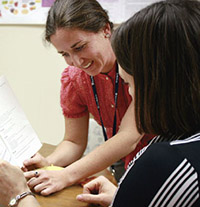
Carla Graves is a bilingual Registered Dietitian who began her employment at Chester County Hospital in early May 2016 as part of Community Health and Wellness Services. Graves is not just another helping hand however, she is the answer to a growing need in our community. She is now extending her reach to those who need it most, especially for expectant moms.
The hospital's Prenatal Clinic delivers hands-on Ob/Gyn care at a reduced cost to women throughout Chester County. Roughly 12% of all pregnant women that walk through its doors are diagnosed with gestational diabetes, slightly higher than the national average of 9.2%. Gestational diabetes is diagnosed when pregnant women who have never had diabetes before develop high blood-glucose levels during pregnancy. If left untreated, or poorly controlled throughout pregnancy this condition can cause harm to mother and baby.
English is a second language to 80% of the Clinic's patients. An overlap of non-English speaking women diagnosed with gestational diabetes has resulted in an "efficiency problem in the delivery of care" according to Julie Funk, Director of Community Health and Wellness Services.
Patients diagnosed with gestational diabetes rotate between the Clinic, Maternal Fetal Medicine and Diabetes Education. They receive general care for their pregnancy, treatment for gestational diabetes and education for how to manage this diagnosis in everyday life. The critical need for a bilingual caregiver was recognized when providers in all three departments were seeing issues with phone communication about appointments, scheduling delays due to the need to also schedule an interpreter and a loss of educational quality through a third person.
Carla Graves will be the answer to that need. Funk is optimistic that Graves' arrival will result in fewer time delays for appointments and "improve the continuity of care and outcome of care by providing a face-to-face connection with a provider who speaks the same language." Graves will also be addressing topics such as how to test blood sugar throughout pregnancy, how to gain proper nutrition and how to manage gestational diabetes after birth.
Gestational diabetes will often go away after pregnancy but the condition does increase a woman's risk of another diagnosis with future pregnancies. Gestational diabetes can even cause a diabetes diagnosis later on life for both mother and baby. Women with this condition need to have a blood glucose test 6-12 weeks after giving birth and then on a regular basis after pregnancy. Babies born to mothers with gestational diabetes should also be checked throughout childhood for risk factors associated with diabetes. Funk's hope for Graves' role is that the reception of this information is better received through a one-on-one encounter with the actual provider. "The women often won't know these things and therefore won't know to ask about them at checkups."
In addition to being an asset for patients with gestational diabetes, Graves will also be a valuable aid at community activities throughout Chester County. The hospital participates in numerous activities such as the Mushroom Festival, Healthy Kids Day at the YMCA and others held at La Comunidad Hispana. Healthy lifestyle and nutrition issues will be addressed with the Spanish-speaking community at these events.
Chester County Hospital's Community Health and Wellness Services has also found a way to address the cost of care barrier related to gestational diabetes. Many women who are seen through the hospital's Clinic are unable to afford meters and testing strips, which are needed to manage their condition. The annual Dash 4 Diabetes is held in April each year and all proceeds from the Dash benefit the hospital's Diabetes Self-Management Program. The funds from the 2016 Dash will be used to purchase glucose meters and testing strips to give to diagnosed Clinic patients free of charge. Patients will receive one meter and enough strips for the remainder of their pregnancy eliminating the financial barrier they currently face.
Funk says these solutions are a result of "a continued focus on positive birth outcomes for both mother and baby." Community Health and Wellness will evaluate these solutions by measuring appointment attendance and time, birth weights/birth outcomes and results of a satisfaction survey taken by patients.
About Chester County Hospital
Chester County Hospital is an organization dedicated to the health and wellbeing of the people in Chester County and surrounding areas. Founded in 1892, the non-profit hospital has grown into a 243-bed acute care facility based in West Chester, plus it has a system of outpatient locations in Exton, West Goshen, New Garden, Jennersville, West Grove and Kennett Square. In 2013, Chester County Hospital became part of Penn Medicine that consists of the Raymond and Ruth Perelman School of Medicine at the University of Pennsylvania (founded in 1765 as the nation's first medical school) and the University of Pennsylvania Health System, which together form a $4.3 billion enterprise. In addition to quality-driven inpatient medical/surgical services, Chester County Hospital also offers home health, hospice and skilled nursing care; occupational medicine; outpatient laboratory, radiology and physical therapy services; an ob/gyn clinic for the underserved; wound care; and cardiopulmonary rehabilitation.